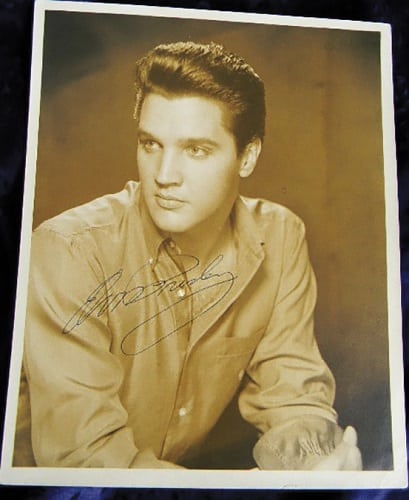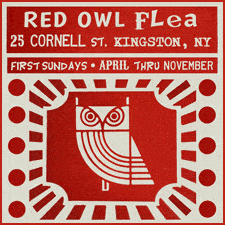Lessons Learned from The King
by Stephen Shutts, the “Indiana Jones” of Memorabilia
We have been in the era quite some time now, where the average rock & roll fans have looked beyond the listening pleasure of their favorite groups and delved further by investing in memorabilia from their favorite bands or recording artists. In the age of mancaves and families seeking alternative investment opportunities to get ahead, leery and disinterested in potential real estate bubbles bursting or buying into non tangible and “get rich quick schemes,” buying pop culture has become the fun and en vogue way to invest.
For the consideration of an average investor, the satisfaction of holding something tangible and attributed to their favorite band or artist certainly comes with bragging rights of ownership. Personally dealing in memorabilia, specifically Elvis and country music legends for 25 years, I am partial and most passionate about collecting Elvis memorabilia. Elvis, the brand and image, has stood the test of time beyond the 1980s idiotic media attention towards overweight Elvis sightings at the local burger joints or quick marts, and maintained a staying power with consistent references to the mean, lean, sex machine Elvis that everyone, and I mean everyone, recognizes worldwide.
Elvis memorabilia collecting exploded into the mainstream of Americana in the mid-1990s when Butterfield & Butterfield began auctioning the vast collection of the Jimmy Velvet museums. The first auction proved to be monumental and soon after Elvis fans with cash were able to acquire jumpsuits, cars and jewelry once possessed by the greatest entertainer the world. People came forward selling treasures Elvis bestowed upon them. No longer did you have to lust at Graceland’s doorstep or at the Hard Rock Cafe’s eye-candy. You, as a buyer, could create your own homespun tribute to the King. Prior to the mid-1990s only a handful of people collected on a grand level worldwide. Today, those same people have become friends, associates and clients and are still collecting 20 plus years later. They have been good to Elvis and Elvis has been good to them.
Elvis gave away personal items and automobiles like candy. The lucky recipients of those items, most now entering into the final chapters of their lives with retirement and retirement communities in mind, sell routinely and more readily than the newbie collector might imagine or know. This provides a smorgasbord of artifacts to collect, from entry level to advanced collecting. The flip side is that fakes and forgeries are rampant. Elvis’s generosity made it easy for the market to become flooded with often elaborate fakes and bogus stories attached to them.
When collecting, deciphering fact from fiction is of utmost importance. I have had the unfortunate circumstance of telling buyers that the items they purchased are not authentic on numerous occasions. Not to focus on the negative of collecting, but to provide the warning signs, and to prevent unpleasant news down the road, we will address some of the concerns and warning signs regarding authenticity. We will address the up side of collecting as well.
Regarding autographs, the authenticity is in the details. Ask autograph experts for their opinion. I say experts, as there are multiple experts in the arena of authenticity. Experts can determine a fake/forgery based on vast particulars. Significant handwriting characteristics, year potentially signed, environment signed in (fast paced or more leisurely), document vs. signed for a fan, was the autographed obtained through an entourage member or directly from Elvis, etc. are all layers of understanding and determining an authentic signature. Just 15 years ago you could buy autographs from the person who obtained from Elvis in person. Today those people have passed on and you are dealing with relatives or estate liquidators who were not present and therefore some information is missing and additional detective work is needed for the purist collector.
The same detective work holds true for collecting personal items once belonging to Elvis. Acquiring affordable token items that Elvis might have accepted from fans or items that were used or displayed at his beloved home, Graceland is fun, rewarding and at times affordable. Here though again researching is always mandatory to acquire authentic artifacts. Letters of authenticity or certificates of authenticity known in the memorabilia industry as LOA’s and COA’s mean nothing if the source from which they originated from have questionable business practices or are from people claiming to have had ties to Elvis, but never actually did. Furthermore alarming, is what I deem to be the “magic closet” syndrome where people actually knew and or were associated with Elvis and obtained artifacts from Elvis during their involvement with his career. Fast-forward, money is needed by these sellers and suddenly they produce items for sale they suddenly recall Elvis gave them years ago. This has become the most recent concern amongst Elvis collectors Ö authentic acquisitions from once reputable sellers who are now selling fakes. These same concerns and situations apply to higher end artifacts as well. One must do their homework and research by tapping Google and reaching out to the veteran collector community. Additionally it must be stated elaborate fakes have been known to surface in what are considered reputable / large auction houses. No one who collects, buys, sells and brokers on a grand scale is exempt from needing to do their homework consistently to avoid the pitfalls of collecting. Please note, analyzing an artifact reported to have belonged to Elvis is like peeling the layers of an onion. The more expensive the artifact, typically the more layers to peel regarding discovery of facts and a greater understanding of authentic or non-authentic attributes.
For the collectors who wish to invest in other recording artists memorabilia I would recommend these artists and for these reasons. First, naturally interest gets peeked when someone such as David Bowie or Glen Frey of The Eagles passes away. Anyone in the classic / iconic rock arena who had monumental influence internationally will always have staying power. The Rolling Stones are a great example of a band that I believe will have greater “collectability” as time passes, much like in the case of the Beatles. The Beatles and Michael Jackson are two examples where interest continues to rise and it translates to high-end buyers stepping up for Smithsonian-quality memorabilia. Regarding contemporaries, it is tough to gauge recording artists like Taylor Swift or Beyoncé for example. They still have the capability to fail in the public eye. I would recommend purchasing current recording artists memorabilia for nothing more than enjoyment vs. long term investment value. Keep in mind the values of this type of memorabilia could drop once a stars limelight begins to dim.
At the end of the day always remember: you will never lose financially when collecting rock & roll legends artifacts.
Stephen “Elvis” Shutts had an eye for collecting at a young age. After attending college near Memphis, TN his motivation to buy and sell was fixated on Elvis and Country Music artifacts. In 2013 Stephen starred in his own reality TV Series with Robert Reynolds of The Grammy Award Winning Mavericks, titled “Raiders of Rock.” The TV series chronicled the pursuit of long lost rock ‘n’ roll treasures from Elvis, Johnny Cash, Guns N’ Roses and Pink Floyd to name a few. Stephen/Rockology continues to authenticate, appraise, broker, buy and sell memorabilia for numerous clients. His new book Send Lawyers, Guns & Money … The Pursuit of Rock ‘n’ Roll Memorabilia is due out in the Fall of 2016.
I would simply evaluate and/or ask yourself these questions to determine your level of collecting desired
1) Set a realistic budget for yourself. Do you want to save for one special item or would you like to collect multiple pieces? Only you the collector can determine this based on your pocketbook and budget at hand.
2) Determine what areas you wish to collect. Do you like records / vinyl? Would you prefer to collect autographed material? Does the thought of acquiring personal items Elvis wore and or possessed seem more exciting? Would you prefer to collect concert memorabilia such as ticket stubs and tour promotional items? Determine your interests and go after your targeted memorabilia.
3) Know your negotiation skills. We all become overzealous at times and pay full retail when possibly we can save a few bucks by haggling when haggling is acceptable. By rule of thumb, study the market and know what are considered retail values for the items you collect. If you are acquiring to keep, then you might have a tendency to pay near the retail asking price. If you are buying to resell or flip immediately then it would be advantageous to acquire at 50%-70% of the retail value if possible. Gouging by attempting to buy with the “old antique dealer” approach of “your item is not worth much… I will take it off your hands for” is nothing more than obnoxious. Everyone wants a good deal, but be fair when buying. If you are buying to resell you will expect the buyer down the road to be fair to you as well. For the keepers in your collection feel okay about having paid 80%-100% of the value. Don’t kick yourself if your negotiation skills were not as sharp on one deal. Be prepared for the next deal.
4) Be sure and gather any and all documentation pertaining to your acquisition. If there is not any, start a paper trail with all pertinent details attached to the item with pen to paper and a signature from the person you are obtaining the artifact from. Having a notary witness the signature is a plus.
5) Utilize your finds by decorating. Give yourself a reminder of the joy of collecting by framing up or displaying where applicable. Safeguard your collection by using museum quality materials when framing. Protect and showcase your collection for yourself and others to enjoy.
6) Insure your collection if it begins to grow with much hard earned money invested. Research insurance companies that specialize in the collector realm of coverage.











Related posts: